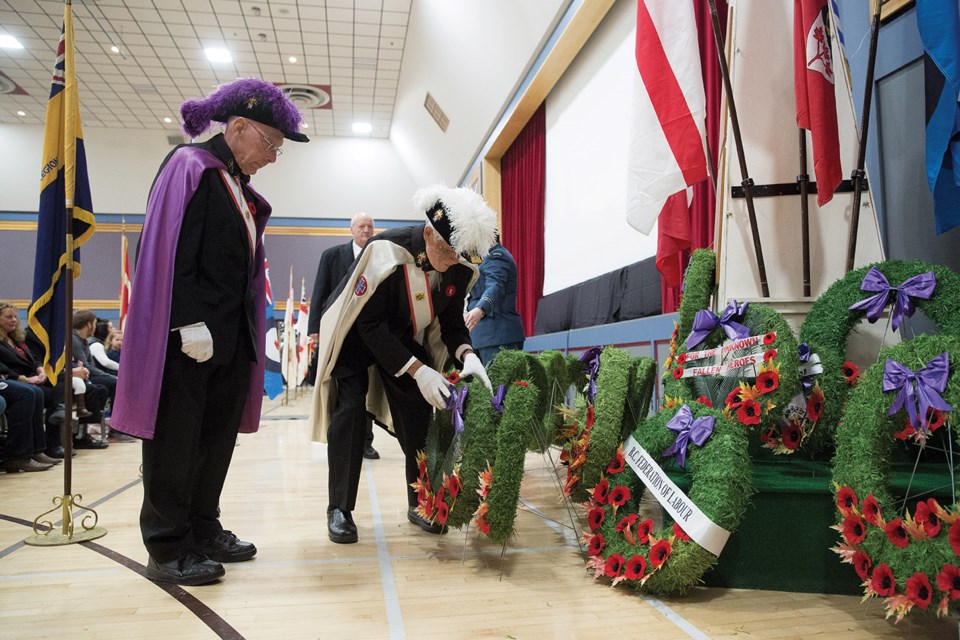Alan Dixon was a 16-year-old Manitoba farm boy when he and friend decided to enlist in the army. It was July 1944 and like many young soldiers of the Second World War-era, Dixon was looking for adventure and chance to see the world.
He smudged dirt over the birth year of his registration card and retyped it and was sent to Fort Osborne in Winnipeg. But his commanding officer determined that Dixon wasn't old enough and sent him home. The following year, in April 1945, a month after his 17th birthday, Dixon tried to join the Canadian Armoured Corps again and this time it worked. He was sent to the Camp Borden military base in Ontario and became a tank gunner/radio operator.
"I was determined to get over there," said the 89-year-old Dixon, "When the war in Europe ended I became a Pacific volunteer and I was scheduled for training in the U.S. in jungle warfare when Truman dropped the bomb on Hiroshima and things came to a screeching halt."
Dixon was sent to a demobilizing unit in Winnipeg and was discharged in November 1945. Twenty years later he moved to Prince George to become a direction supervisor at Northwood Pulp Mill. He's been retired since 1979.
On Saturday in front of a near-capacity crowd of about 1,300 gathered at the Civic Centre for the Remembrance Day ceremony, Dixon recited Moina Michael's 1918 poem, We Shall Keep the Faith.
Oh you who sleep in Flanders Fields,
Sleep sweet - to rise anew!
We caught the torch you threw
And holding high, we keep the Faith
With all who died.
We cherish, too, the poppy red
That grows on fields where valor led;
It seems to signal to the skies
That blood of heroes never dies,
But lends a lustre to the red
Of the flower that blooms above the dead
In Flanders Fields.
And now the torch and poppy red
We wear in honor of our dead.
Fear not that ye have died for naught;
We'll teach the lesson that ye wrought
In Flanders Fields.
The author was inspired by Canadian doctor John McCrae's more famous military poem, In Flanders Fields, which he wrote in 1915 while fighting the First World War in Belgium. For Dixon,Michael's poem explains the significance of wearing a poppy on Remembrance Day
"I've only seen that poem once and I liked it, and so I copied it," said Dixon. "It just seemed appropriate and it caught my eye."
The Remembrance Day gathering that followed at the City Hall cenotaph was one of the largest ever with the crowd estimated at about 2,500.
Second World War veterans John Kuharchuk and Armand Denicola laid wreaths to honour the soldiers. Both served in the Canadian Scottish Regiment around the time of the D-Day landings at Normandy in June 1944 but they never knew each other until they met in Prince George 20 years ago.
Denicola, who is nearly 96, was wounded in action on Juno Beach. Kuharchuk, 93, fought on the front lines in France and Germany for 10 months until the end of the war. He avoided serious injury but suffered shell-shock and a loss of hearing in both ears when a grenade exploded in the house he was in.
"It was a tough project to start with, but I think I was wiser for it afterward," said Kuharchuk, who grew up on a farm near Evansburg, Alta. "I joined the army for adventure and within a year you're overseas on the front lines and it just blows your mind.
"When you were in a battle making an attack, you seem to lose all your fear," he said. "You just go out there and do what you have to do. There's people getting hurt and dropping, getting wounded, and you have to move on, you can't stop and help. That was one of the hard things about it.
"But it was a learning experience and it wasn't wasted. I was one of the fortunate ones and I was able to come back and carry on with my life. I'm glad I went."
As one of the only soldiers with a driver's licence right after the war ended, Kuharchuk's job for three months while stationed in Holland was driving a three-ton mail truck to take letters and parcels to his fellow soldiers. Considering the cargo he delivered from company headquarters to the war-weary troops longing for any reminder of the people they left behind in Canada, he was one of the most popular soldiers in his company.
"Every day, seven days a week at 10 in the morning I'd pick up the company mail, and I was busy," said Kuharchuk, who returned to start his own logging company in Fort St. James.
The ceremonies paid tribute to first responders, including the RCMP, who recently lost one of their members when Const. John Davidson of the Abbotsford Police Department was shot and killed in a strip-mall shooting in Abbotsford.
"We as an organization have a very proud tradition serving Canada with roots in history with our involvement in our wars as well, and today means a lot us," said Warren Brown, superintendent of the Prince George RCMP detachment. "It's all too often that we don't have to look too far to remember those in our forces and ranks who have fallen in the service of our country, including the municipal police, as we saw in Abbotsford.
"We're proud and honoured to have a day like this celebrate and remember those of the past."



